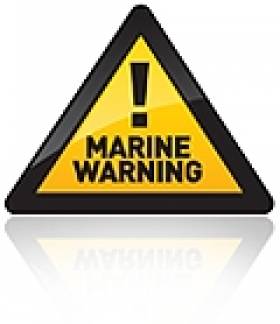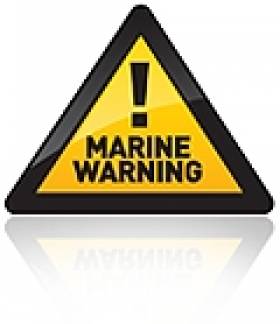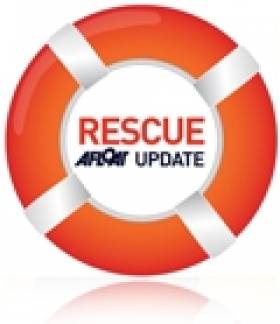Displaying items by tag: tide
Unusual Tide Action in West Cork Will Be Analysed
Data from the M3 and M5 buoys off the South Coast is being recovered for analysis by the Marine Institute to ascertain whether it can explain the cause of a tidal drop of 70 cms reported at Union Hall and Courtmacsherry in West Cork last Saturday afternoon.
Local people described the tide level dropping in a few minutes and then flooding back in.
There have been further reports of similar happenings on the Wexford coast and in Wales.
As Afloat reported earlier, descriptions of what happened in the area of Glandore Harbour where Union Hall is located have varied, from some people describing water levels leaving boats temporarily touching bottom where they were moored, to others who claimed the tide “came in and out several times…” and another comment: “the tide was going the wrong way…”
 A fishing boat in Glandore Harbour
A fishing boat in Glandore Harbour
Amongst reports of seismological activity on Saturday were a 2.6 magnitude earthquake before noon near the Azores. That was logged at the European Mediterranean Seismological Centre.
Historical context records a 1755 earthquake off the coast of Portugal, which was reported to have caused damage on the Irish South Western coast.
Amongst suggestions for the cause is atmospheric pressure, northerly wind and known water actions at the areas involved. Oceanography sources have tended to discount the incidents in West Cork being associated with the seismic action off Portugal. “It would not be big enough to have that effect,” I was told. “Rare, unusual, possibly driven by a number of factors that may lead to an unusual event, but in this case the cause is so far not clear, so examining date from the buoys at sea may help to indicate it.”
No other Cork coastal areas have reported anything similar.
A Marine Institute statement said: "An unusual tidal event was observed on Saturday 18th June 2022 at Union Hall (West Cork) at 14.40 (UTC) with a low water of -2.629m measured by the Irish Tide Gauge Network.”
Strong Tides Over Christmas Carry Dangers for Swimming, Boating, Surfing & Diving
Water Safety Ireland has issued a warning over the dangers of strong tidal streams tides over the Christmas period.
On St. Stephen’s Day there will be a new moon. A new moon will increase the range of our tides causing higher and lower tides. This will expose large areas of beach and rocks which we don’t see during neap tides. Many people enjoy exploring these new areas of beach and in particular, enjoy picking shellfish to eat.
As you walk shorelines, keep a close eye on new moon tidal advances and carry your mobile phone in case you are cut off.
"On St. Stephen’s Day there will be a new moon"
The risk of becoming stranded as the tide advances can quickly leave people cut off from the shore which is why people should carry their mobile phone and call 112 if required.
All those swimming, boating, surfing, or diving should be aware of stronger tidal streams around our coast over the Christmas period.
Swimmers need to be aware of the risks rip currents will have on our beaches. The public is encouraged to access tidal information through newspapers and online.
Beware of High Tides Caused By the Full Moon
#fullmoon – The warm weather has brought many people out to enjoy the seaside and coastal walks, however the CEO of Irish Water Safety, John Leech is warning the public that there is a full moon tomorrow 2nd of July which is causing high spring tides which poses a higher risk of being washed in to the sea or being dragged out to sea by a rip current.
A danger foreseen can avoided...
Walkers should remain alert and stay well away from the edge of ordinarily familiar coastal walks due to the risk being washed in by large Atlantic swells. Those walking on our beaches and collecting sea shells should be alert to a fast advancing tide and of being stranded. Please carry your mobile phone and ideally in the company of others.
Anglers should be extremely vigilant, three having drowned so far this year. Atlantic swells present a clear danger to shoreline anglers and a substantial distance from the edge should be maintained at all times and always wear a lifejacket.
Swimmers be awareof rip currents, especially on surfing beaches, never swim against this narrow current of water flowing away from a beach. Instead, swim parallel to the shore, out of the narrow current, then swim back to shore at an angle. Details at http://www.iws.ie/beach/rip-current-safety.328.html
Divers completing drift dives need to carefully calculate the rate of drift and ensure that the dive boat maintains contact with their divers throughout the dive.
If an emergency develops don't delay - Call 112 and ask for Coast Guard.
Beware of Tides on Busy UK Bank Holiday
Coastguard coordination centres have dealt with at least eight different incidents this afternoon involving a total of 16 people who have become cut off by incoming tides at different places around the coast.
In Pembrokeshire, six people were rescued from the water by Little Haven RNLI lifeboat at Setlands Beach near Broad Haven and at St Dogmaels the Cardigan RNLI inshore lifeboat recovered a woman who was stuck thigh deep in mud.
Humber Coastguard was alerted to two people and their dogs trapped by a fast rising tide near Bridlington. They were unsure of their location and as rescue units began searching for them, the couple were fortunately spotted by Hornsea Rescue lifeboat who recovered them from the water in a distressed condition.
Mike Bill, Coastguard Watch Manager at Humber Coastguard says,
"Coastguards are warning people at the coast to check tide times to ensure you are not caught out. Talk about how the tides work with your family and make sure everyone understands how tides work and what the dangers are when walking at the coast."
Children Rescued From Co Down Waters
Four teenagers were rescued in Co Down last weekend when they were cut off by the tide, the News Letter reports.
The teens were caught up to their shoulders in water at Ardilea on Saturday evening when they were retrieved by a former volunteer coastguard who lives nearby.
The group were met at the shore by the South Down Coastguard Rescue Team and NI Ambulance Service paramedics and taken to hospital showing signs of hypothermia.
Meanwhile, on Friday night RNLI Bangor lifeboat rescued a young girl stranded on a rock near Groomsport after a call from a member of the public.
“With waves breaking around the knees of the frightened child it was paramount that she be brought ashore as quickly as possible," said a coastguard statement.
The girl was treated by waiting paramedics at the shore.



























































